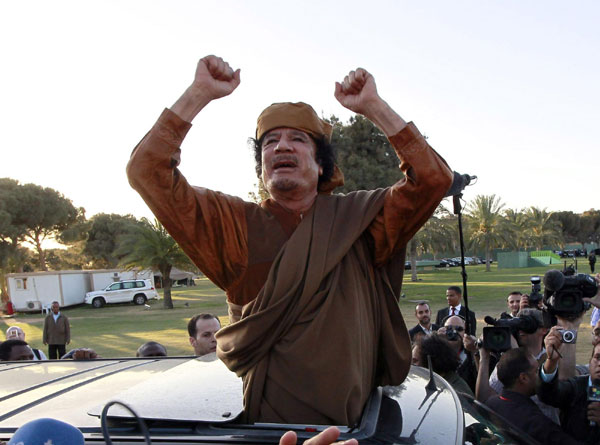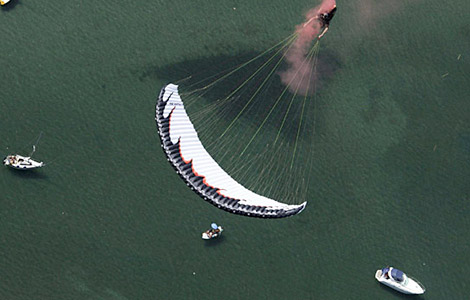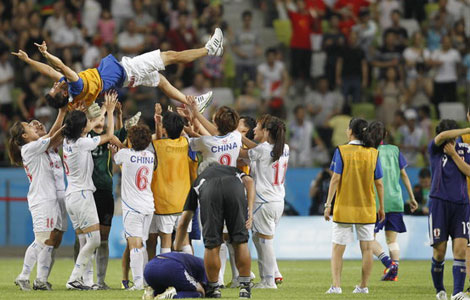Profile: Muammar Gadhafi
Updated: 2011-08-22 08:45
(Xinhua)
|
|||||||||||
|
 Muammar Gaddafi waves from a car in the compound of Bab Al Azizia in Tripoli, after a meeting with a delegation of five African leaders seeking to mediate in Libya's conflict, in this April 10, 2011 file photo.?[Photo/Agencies]? |
Since protests erupted in Libya in early 2011, which were inspired by similar anti-government demonstrations in other Arab countries, 69-year-old Gadhafi and the oil-rich North African nation, with a population of about 6.5 million, have stayed at the center of spotlight of international media.
TOP FIGURE
In early February, people took to the streets in Benghazi, the second largest city in Libya, to voice opposition against the country's top figure who was known for being independent in his words and actions.
In power for 42 years, Gadhafi has provided the Libyan people with basic living guarantees, but meanwhile won over key tribesman (tribes and clans consist of a majority of Libya's politics as Gadhafi bans all political parties) in the country by means of money and power so as to maintain his dominance.
When gradually squandering vast wealth, he was blamed for setting ceilings for citizens' salaries, ignoring investing on civil structure, and leaving jobless rate high outside the government.
Gadhafi entered Benghazi Military University Academy before serving in the Libyan army in 1965, and was sent to Britain Royal Military Sandhurst for training in 1966.
His rule started in September 1969, after the then junior officer, leading several of his colleagues in the "Free Officers Movement," staged a bloodless coup that toppled ageing King Idris, who was then undergoing medical treatment in Turkey, and established the Libyan Arab Republic. And Gadhafi became the chairman of the Revolutionary Command Council (RCC) and commander- in-chief of the Armed Forces of Libya.
He served as the country's minister of defense while being the prime minister from 1970 to 1972. In 1977, he became the " Revolutionary Leader of Libya," and relinquished all administration positions in 1979, retaining only this title.
Fed up with monarchical corruption and earlier colonial occupation (Italy dominated Libya from 1911-1951), Gadhafi, starting from the 1970s, made the Libyan people beneficiaries of free education, free health care, and subsidized housing and transport, with the help of the country's huge oil revenue and its relatively small population.
In the mean time, he imposed strict Islamic governance, banning vices like gambling and alcohol, and started a system of Islamic morals in the country. Cities like the capital Tripoli started to flourish with new buildings and hotels, turning into a destination for tourists and businessmen from across the world.
But these efforts were proved inadequate to speed up and diversify the country's growth to the largest extent, as, to hang up to dominance, Gadhafi crippled independent trade unions and major civil organizations along with political parties. He destroyed the state apparatus and began navigating the country with greater power even than that of a president.
As time went on, even Libya's pride in its healthcare policy has gone beyond disbelief. Reports by the Pan-Arabist Al-Arabiya television said shortly after the outbreak of the turmoil this year that some Libyan citizens were resorting to Tunisia, Egypt and Jordan for necessary medical treatments, paying billions of dollars a year, after finding the system in their own country ineffective and unreliable.
The Saudi-based channel said the public distrust was evoked especially after contaminated medical tools had led to HIV infection of more than 500 children in Benghazi in 1999.
Universal misery is to many Libyans, the earliest rallies in Benghazi in February caused an immediate contagion in a number of key cities including the capital Tripoli.
DEFIANT LEADER
To Gadhafi, the protests should hardly have been a challenge. The man, born in the desert region of Sirte in 1942 and a life- long soldier, has survived numerous wars with countries like Chad and Uganda in the 1980s, as well as repeated assassination plots including one in 1996 -- allegedly by Britain's Secret Intelligence Service after a decade-long cessation of ties which was triggered by the killing of a British policewoman by Libyan diplomats in 1984.
Moreover, he was mostly known for his defiance following the December 1988 bombings of a plane over Lockerbie of Scotland, in which Libyans were implicated.
The hijack, which cost 270 civilian lives among which 189 were Americans, was deemed as one of a series of responsive acts of violence in the 1980s between the United States and non-state or state-sponsored terrorist groups in the region.
Gadhafi refused to turn over the terrorist suspects until 1999. In 2003, Libya formally claimed responsibility for the bombing, but never offered apology for the attack. In 2009, when the only convicted Lockerbie bomber Abdel Basset al-Megrahi was released from Scottish prison on compassionate grounds, Gadhafi welcomed him at the airport, again outraging Washington.
But in times, Gadhafi also assessed the situation and make compromises, especially after years of sanctions by western countries as well as the United Nations in the 1990s. In 2001, to survive his political life, Gadhafi stood out quickly to denounce the September 11 attacks in the United States. He also announced in 2003 Libya's abandonment of its weapons of mass destruction programs.
CIVIL WAR
But, having found the demonstrators in February's rallies unusually determined, Gadhafi resorted to force, launching indiscriminate attacks which claimed civilian lives. But violent clashes simply sharpened antagonism and shoved the country to the brink of a civil war.
Some government officials then defected, picking up weapons to join the protesters and the rebels. However, the rebel troops, out- of-uniform and with only a barren arsenal, were no rival of the government force. But a UN resolution, adopted on March 17, won respite for them.
The resolution, proposed by France, Lebanon and Britain in the name of protecting civilians, demanded an immediate ceasefire, authorized the establishment of a no-fly zone over Libya and strengthened the arms embargo. Yet it essentially provided the legal basis for military intervention in the domestic conflict of the country.
As the Libyan government failed to observe a ceasefire as announced, France, Britain and the United States started on March 19 air strikes that aimed to surrender Gadhafi. And on the last day of May, NATO took over the command of the military operation in Libya after its only Muslim member Turkey nodded to the plan.
Daily targeted raids have claimed the lives of Gadhafi's son Saif al-Arab, three of his grandchildren, forced him to hide from place to place, and severely degraded his military capacity. Meanwhile, he fell further into disgrace as countries including France, Qatar, and the United States recognized the rebel National Transitional Council (NTC) as the sole legitimate representative of the Libyan people.
Countries that were once on the side of the Libyan government such as Russia also took a turn in May to request Gadhafi to give up power. But he continued with his defiance, ignoring the arrest warrants sought by the International Criminal Court and rebuffed the mediation efforts of South African President Jacob Zuma.
But since July, Gadhafi turned gradually out of the world's sight. His forces waned from then on, as Libyan rebels said in mid- August that they had taken the gateway of Tripoli, Zawiyah, cutting the coastal highway to Tunisia which keeps the capital supplied with food and fuel, and that they had controlled Zliten in the west front, a remarkable move to completely cut off roads to the capital.
Now, a new page is to be unveiled in Libya's history, yet whether the page tells a delightful or awful story remains to be seen. But what is certain is that the destruction brought about by the war, be it material or mental, will be cured only by time, and the destiny of the Libyan people could only be determined by themselves.
Hot Topics
The European Central Bank (ECB) held a conference call late on Sunday ahead of the market opening, pledging the ECB will step in to buy eurozone bonds with efforts to forestall the euro zone's debt crisis from spreading.
Editor's Picks

|

|

|

|

|

|







